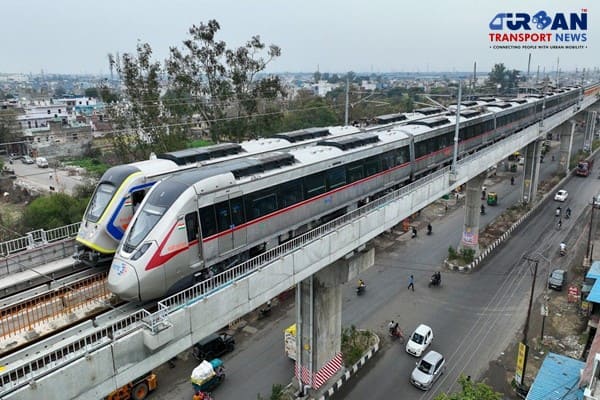 India Makes History: Namo Bharat RRTS and Meerut Metro to Run on Same Track
India Makes History: Namo Bharat RRTS and Meerut Metro to Run on Same Track How the Standard for Car and Truck Wheels Is Changing
How the Standard for Car and Truck Wheels Is Changing How Cross-Docking Is Reshaping Urban Logistics
How Cross-Docking Is Reshaping Urban Logistics Ola, Uber Fares Set at 50% Minimum; Bike Taxis Legalised Under New Guidelines
Ola, Uber Fares Set at 50% Minimum; Bike Taxis Legalised Under New Guidelines India to review Celebi Aviation contracts amid National Security concerns
India to review Celebi Aviation contracts amid National Security concerns The AI Revolution in Brand Communication: A Dubai Perspective
The AI Revolution in Brand Communication: A Dubai Perspective Tackling Supply Chain Blind Spots with Machine Learning
Tackling Supply Chain Blind Spots with Machine Learning Saudi Arabia issues Design Tender for $7 Billion Landbridge Railway Project
Saudi Arabia issues Design Tender for $7 Billion Landbridge Railway Project Cab Aggregators to pay penalty for cancellations by Drivers under New Maharashtra Policy
Cab Aggregators to pay penalty for cancellations by Drivers under New Maharashtra Policy Ola Electric under Fire for allegedly Inflated EV Sales Figures
Ola Electric under Fire for allegedly Inflated EV Sales Figures
The emergence of legaltech simplifying on-road legal processes for transporters

The transportation sector is considered the backbone of the economy that helps fuel industrialization and urbanisation in the country. Road transport, especially trucks handles 70% of India’s goods transportation needs, transporting nearly 2.2 Trillion kilometres of freight in India. It is significantly undergoing a rapid transformation with rigorous construction activities on highways to build a connected and highly developed infrastructure.
Despite extensive development, drivers and transporters in India struggle with legal challenges, mainly emerging from their on-road job duties. Obstacles such as traffic challans, penalties and harassment put a burden on their financial stability and disrupt their work. Subsequently, it becomes vulnerable for drivers and transporters to navigate the complexities of the legal landscape.
As technology continues to penetrate deeper, the legal industry is no longer an exception and undeniably undergoing an era of transformation. To address on-road traffic-related challenges, the emergence of legal tech has become a powerful enabler for transporters as most of the drivers who operate in rural and remote areas struggle with the lack of real-time support, language barriers and the financial burden of legal proceedings. This clearly exhibits the need to simplify legal compliances, providing immediate assistance and empowering transporters.
Understanding Legal Challenges Faced by Transporters
The advancements in technology have taken place across sectors and the traffic department is no longer behind the league of using handheld devices, cameras and a central database to issue e-challans for any traffic violation. A repetitive or perceived traffic violation often leads to an overwhelming number of challans, putting pressure on both driver and transporter even if they are unaware of their legal obligations. This leads to penalties for missing fitness certificates, pollution checks or insurance renewals.
In remote areas, on the other hand, drivers often experience harassment by law enforcement which sometimes include bribery demands and undue fines. Subsequently, drivers get trapped into prolonged legal entanglements for which they are usually under-equipped to handle, resolve or oppose.
Financial Stability of Transporters
Legal challenges for transporters impose a heavy financial burden on them as well as their drivers. Considering the limitation on their incomes, drivers often delay in resolving challans, further leading to compounding penalties and vehicle impoundment. Due to a lack of comprehensive legal support and out-of-pocket expenses, drivers find it difficult to handle instances when they must settle disputes or inadvertent situations and make late challan payments.
Legal tech integration offers real-time dispute resolution and assists drivers in overcoming legal challenges by combining challan management with on-road support. This protects drivers against growing costs, guaranteeing their financial security and safety. This support increases drivers' economic resilience while encouraging compliance.
Legal Awareness and Assistance
Getting reliable and prompt legal assistance is a significant challenge for everyone working in the transportation industry. The lack of support in appointing an expert legal representative results in prolonged delays, detainment and consistent loss of income. Furthermore, the unfamiliarity with legal documentation, also arising from language barriers, makes it difficult to comply with the resolution process.
Using legal technology makes it easier to close this gap. Drivers can handle legal issues with ease since they have instant access to legal counsel and support, which simplifies complex processes. Allowing drivers to get legal help while they're on the road ensures that they understand their rights and can stay out of trouble.
Apart from this, to create a driver-centric legal landscape, partnerships between private and public authorities such as between government authorities and legal tech market players can build scalable and inclusive solutions for drivers’ welfare. This will contribute to a fairer and more efficient transportation ecosystem.
Final Thoughts
A number of legal challenges face transporters. Legal technology's rapid development has provided practical solutions to these issues by addressing major gaps in legal accessibility and accelerating compliance. On-road legal aid for drivers is not only practical, but also a strategic step toward obtaining the legal authority required to live a decent and financially stable life. Therefore, by giving all drivers the skills they need to handle both the legal system and roadways, an inclusive atmosphere for carriers can be established.






